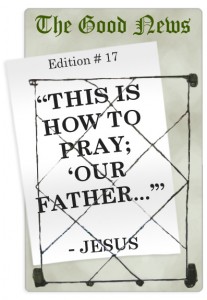 Matthew 6:7
Matthew 6:7
“And when you are pray, do not keep on babbling like pagans, for they think they will be heard because of their many words.
8 Do not be like them, for your Father knows what you need before you ask him.
9 “This, then, is how you should pray:
‘Our Father in heaven,
hallowed be your name,
10 your kingdom come.
your will be done,
on earth as it is in heaven.
11 Give us today our daily bread,
12 Forgive us our debts,
as we also have forgiven our debtors.
13 And lead us not into temptation,
but deliver us from the evil one.’
The Lord’s Prayer
These words begin one of the best known sayings of Jesus – what we call ‘The Lord’s Prayer’. The word Jesus uses for ‘father’ is the equivalent of ‘daddy’ – and Jesus invites us to address God like that! Amazing. But the very next words, ‘in heaven’, remind us of God’s majesty. We should love God and trust him implicitly, but not take him for granted.
So the prayer is the expression of a relationship, in which we express our desire to honour God, receive forgiveness, and ask for our daily needs to be met. But if ‘familiarity breeds contempt’ we need to be careful. There is much more at stake.
First, the relationship is not just an individual thing (our father, forgive us as we forgive). We’re in this together. Second, it is not a cosy personal thing – we are to pray that God’s will be done, and injustice swept away as his kingdom is established. Third, it demands something from us. If we won’t forgive others, God won’t forgive us.
This is not a formula just to be recited by rote, to impress God or other people. It’s a pattern of prayer to help us be fair dinkum in relating to God.
Tom Slater, a trained primary teacher, has been a leader in the Christian Camping movement, Scripture Union and Australian Evangelical Alliance.
(For more on prayer, see “Teach us to pray.”)